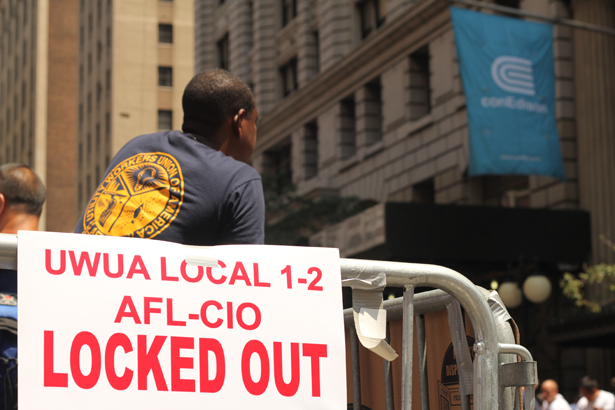
FRANCIS REYNOLDS/THE NATION
Hundreds of union members have descended on New York power utility Consolidated Edison’s corporate headquarters in Manhattan following the company’s decision to lock out 8,500 of its unionized workers in the midst of contract negotiations. Workers were sent home on July 1 after Local 1-2 of the Utility Workers Union refused to agree to give seven days’ notice before a strike. Only weeks after the debacle of the Wisconsin recall, and the subsequent consternation among many in the labor movement, it seems these boisterous union members missed the message that labor is on its way out.
About 500 union members, most of them from Local 1-2 but with contingents from SEIU Local 32BJ, CWA Local 1101 and TWU Local 100, among others, have been picketing outside Con Ed’s headquarters each day since the lockout began on July 1. Today, however, that number increased to more than a thousand, as Con Ed canceled healthcare coverage for Local 1-2 members as part of its effort to ramp up pressure on the union. Other pickets have been set up at Con Ed job sites around the region. The contract dispute centers on the fact that Con Ed wants to get rid of defined-benefit pensions and drastically increase union members’ healthcare contributions.
Lockouts have become increasingly common in recent years, as employers have become more and more proactive at trying to force givebacks on union members. Two of the three biggest work stoppages in 2011 were lockouts. Despite a contentious settlement at the Cooper Tire factory in Ohio, and the continuing fight at beet sugar factories in North Dakota, lockouts aren’t always a losing game for unions—art handlers at Sotheby’s successfully pressured the company into a new concession-free contract in May.
On the Con Ed picket line, Chris Spadafora, a mechanic for the company, pointed out that this fight is about corporate greed. “Were out here because the company didn’t want to pay us. They want to cut medical, they want to cut our pension, they want to cut our wages,” Spadafora said. “But they have a CEO who makes $4,800 per hour!” Con Ed’s CEO Kevin Burke made nearly $11 million in total compensation in 2011, a year in which Con Ed took in nearly $13 billion in revenues and more than a billion dollars in profits. Burke is also a vice chair of the Business Council of New York, the leading lobby for the 1 percent in the state. According to Spadafora, the average wage of a Local 1-2 member is $30 per hour.
Con Ed has brought in management and supervisory employees to do the jobs traditionally done by Local 1-2 members. But as Michael Sutera, another mechanic, pointed out, “They’ve called in 5,000 managers to do 8,500 people’s jobs. They can’t do our jobs. We can.” Spadafora agreed: “Even if the managers came out of the union, they’re still out of practice. One little screw-up and they’re dead. To me this shows that Con Ed doesn’t care about their people, that they’re willing to put them in harm’s way.” In fact, there have already been injuries on the job, with one manager injuring his head on the job on July 2 and another severely burning his face on July 4.
Popular
"swipe left below to view more authors"Swipe →
That managers have been put in such unsafe conditions may be one of the reasons Con Ed has agreed to return to the bargaining table today—although they have made no commitment to end the lockout.
Without giving notice of a strike, Local 1-2 gains more strategic ability to protect the benefits currently received by its members. CWA Local 1101 President Keith Purce, who represents Verizon workers, explained the union’s refusal to give prior notice before going on strike: “We [Verizon workers] went on strike last year for two weeks. And in order to go back [to work], we had to give them an agreement that we would give seven days’ notice if we went on strike. That’s what Con Ed wants to get from Local 1-2. The only weapon we have is to withhold our labor, [the agreement] takes away our strength and our ability to fight.” Local 1-2 spokesman Melia framed the issue as one of fundamental union rights. “We cannot give up our right to strike. That is surrendering, and it flies in the face of rational thought,” he said.
The lockout also highlights some of the continuing friction in labor’s relationship with the Democratic Party. New York City Council Speaker Christine Quinn appeared to be playing both sides by sending a joint letter to Con Ed CEO Burke and Harry Farrell, president of Local 1-2, requesting that Burke end the lockout and that Farrell agree to “reasonable” notice before a walk out, citing concerns about people losing power during a heat wave. But the union’s refusal to provide seven days’ notice is the reason Con Ed locked them out in the first place, leading some union members to believe Quinn is siding with management. The New York City Central Labor Council, of which Local 1-2 is a member, has supported Quinn in the past, but Melia argued that the kind of support that Local 1-2 was getting from fellow unions in the Central Labor Council and the New York State AFL-CIO is more important than the positions of politicians.
Juanita Melendez, a technician at Con Ed, sees the company’s intransigence as an affront to her and other union members. “We’re out here because we got smacked in the face,” she said. “A month and a half ago we all got an e-mail congratulating us for our safety and performance, earning them all this money, and now they want us to pay double in medical, take away our raises, and cut our pensions.… What are they doing?”


